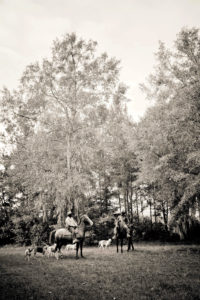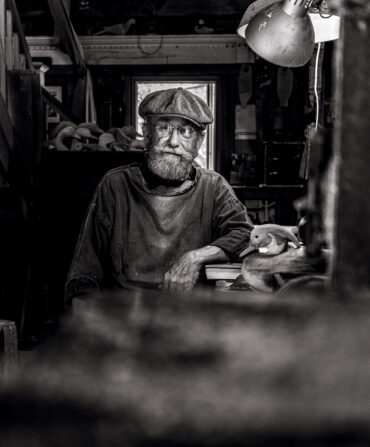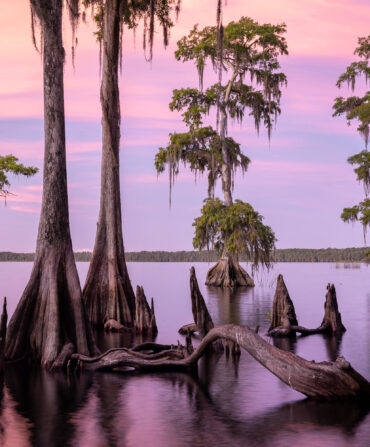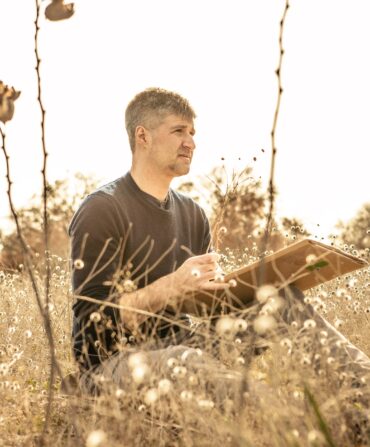Land & Conservation
The Gullah Woodsman: Bill Green
Deep in the South Carolina Lowcountry, Roger Pinckney sits down with Bill Green––huntsman, horse whisperer, chef, and dog trainer––to hear what he’s learned from a lifetime on the land they both love
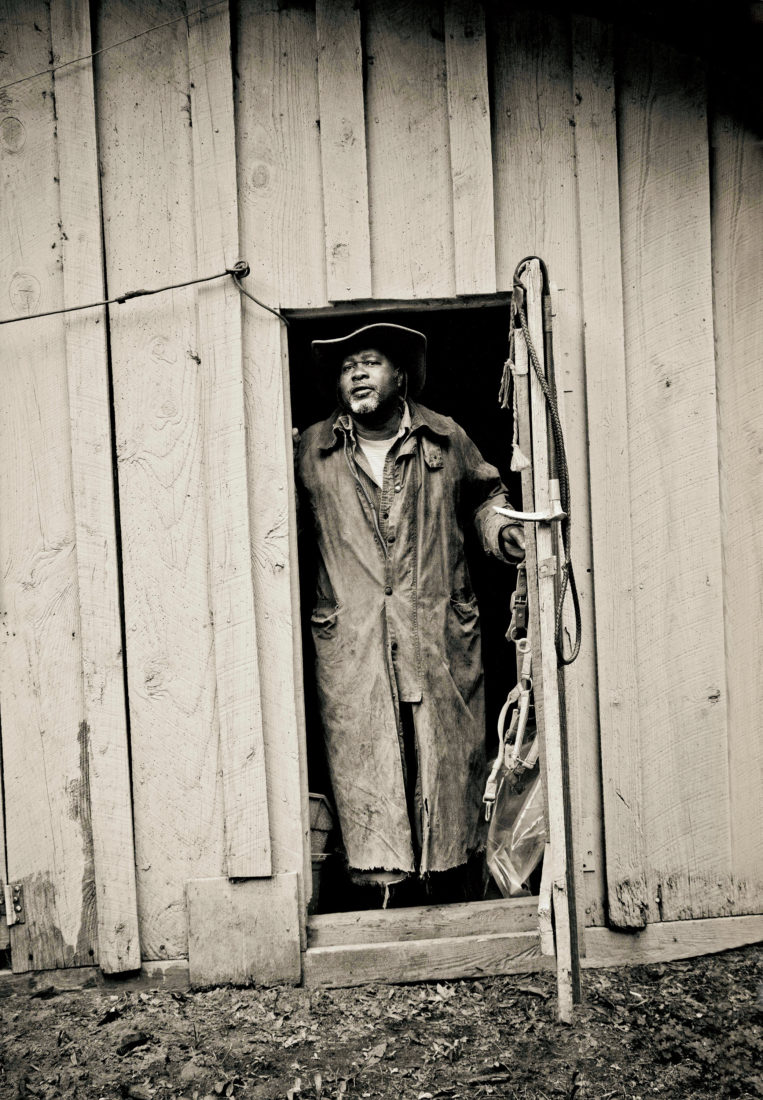
Photo: Peter Frank Edwards
Bill Green settles into his rocker, stretches his legs, wiggles his toes, and holds forth on mules and men, a passion of fifty-three years and counting. “You can work a mule, but you better get his trust first.”
At the moment, Hurricane Isaac is beating the hell out of New Orleans. We’re six hundred miles away as the fish crow flies, but the storm is big, sloppy, and slow—rain and gale for the last three days. Damp but mostly dry, Green, who is sixty-two, and I sit on Miss Liza’s porch. It’s a good place for the spirits to work, Green reckons. A bench under a live oak would be better, but it’s too drizzly for that. Spirits work overtime here on Middleton Place, just west of Charleston, South Carolina.
Green looks off into the middle distance, as if he is reading God’s teleprompter off the rain. His voice is soft and lilting, a gentle patois of slaveship, blues, and voodoo.
“I drove mules when I was nine, hauling collards and cabbages out the field. That mule don’t like you, he’ll wait till the man come around and start stepping all over them plants. The boss thinks you don’t know mule and snatches you off of that wagon quick and puts you on the ground cutting cabbage head.”
Green is pure Gullah from James Island, South Carolina. Most likely you know about the Gullah, our dearest link to Africa. About 250 years ago, West Africans shuffled ashore in Charleston and Savannah, a dusky and barefoot legion some hundred thousand strong. Wide-eyed at sand dunes, palmetto trees, and crashing surf, many must have wondered if the ship had turned around in mid-ocean and brought them home again to the Ivory Coast, the Gold Coast, Sierra Leone, to the beaches of the Bight of Benin.
There can be no bright spot in a life of bondage, but they tried to make the best of it. There were the fish, shrimp, oysters, clams, things they already knew, okra, tomatoes, onions, greens, rice, melons. When possible, there were boats to be built and they could build them; land to be tilled and they could farm; game to be taken and they could hunt. They knit African nets and wove African baskets, endured. They got land with freedom on the Great Day of Jubilee.
After talking mule, Green allows, talking dolphin was easy. “I’d go casting for mullet with my daddy and my uncle. Thump on the boat and call them up.” He stomps three times for emphasis. “Got to know all them porpoise by name. Here comes ol’ Ben. ‘Show us the fish, Ben!’ He swims alongside the boat and take us right to them, way up a dead-end creek. Ben would hem them in and we’d let him eat first. Then he’d back off and we’d throw the net. All the way home, neighbors would come running with washbasin and pan, because they knew the porpoise got us plenty to share.”
By age thirteen, Green was unloading banana boats on the Charleston waterfront. The following year, he switched to wrestling cotton bales. He and his partner, another Gullah farm boy, worked so fast the other stevedores threatened to drown them if they did not slow down. His career on the docks came to a sudden end when he filled out an application to join the U.S. Merchant Marine. “I was a big boy for my age,” Green says, laughing. “They didn’t know I was only fourteen.” His application was soundly rejected.
There are times when a man’s life changes irrevocably in the blink of an eye, the flick of a fish tail, the snort of a porpoise, a holler from somebody you don’t even know. Most men won’t figure it out till years later, and some men never do. But Green knows when it happened to him. Out of work and at loose ends, he was walking along a Charleston street when a man hailed him. “Boy, why you aren’t you in school?”
“School? Man, I make good money—or I used to. Why would I want to go to school?”
“If you’re not in school, you ought to join the Job Corps!”
The Job Corps was part of Lyndon Baines Johnson’s War on Poverty, which was fought to an uneasy stalemate back in the 1960s. Out-of-work young people, minorities mostly, were sent to work on projects for the public good. LBJ sent Green to Colorado to build an arena for small-town rodeos. “Those ranchers had never seen black folks before. We had a camp alongside a creek. We could swim and play in that creek all we wanted but if we got out on the wrong side—pop, zing—the bullets would fly.”
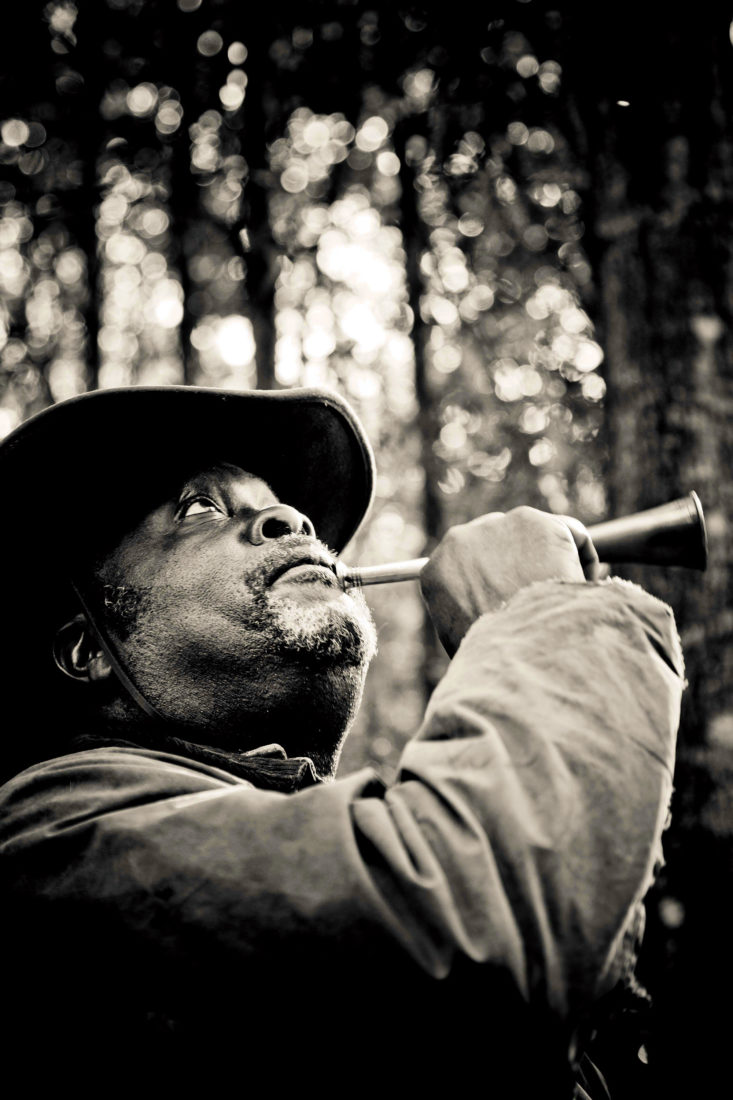
Photo: Peter Frank Edwards
Blowing the fox horn.
Things improved when Green got one-on-one with some ranchers who were much amused by his tales of driving mules as a child. Pretty soon there was a new cowboy on the lone prairie—the Gullah buckaroo, riding, roping, and breaking horses. “I always had the loving-kindness in me,” Green says, “but that’s when I got to be a horse whisperer.”
In the fullness of time, Green would get to be a hound whisperer, a deer whisperer too. Back in the Lowcountry and looking for work, he heard they were hiring at Middleton Place. Middleton is one of the fantastic old rice plantations along the Ashley River, the site of America’s first formal landscaped garden, where azaleas, camellias, and crape myrtles made their debut. It was also home to sundry Middletons, founding fathers, mostly—a president of the Continental Congress, a signer of the Declaration of Independence, an ambassador to Russia, but lastly, a signer of the Ordinance of Secession. That breach of etiquette was not lost on Union forces, who looted and burned the plantation in the closing months of the war.
Though the historic complex of gardens and buildings has since been restored and is now maintained by a nonprofit, when Green first set foot on Middleton, it was a working plantation of some five thousand acres. “Old Man Bailey” was foreman, Green remembers, and wouldn’t hire any hands without a high school diploma. But meanwhile, Miss Liza had a pot of fatback and peas on the back of her stove.
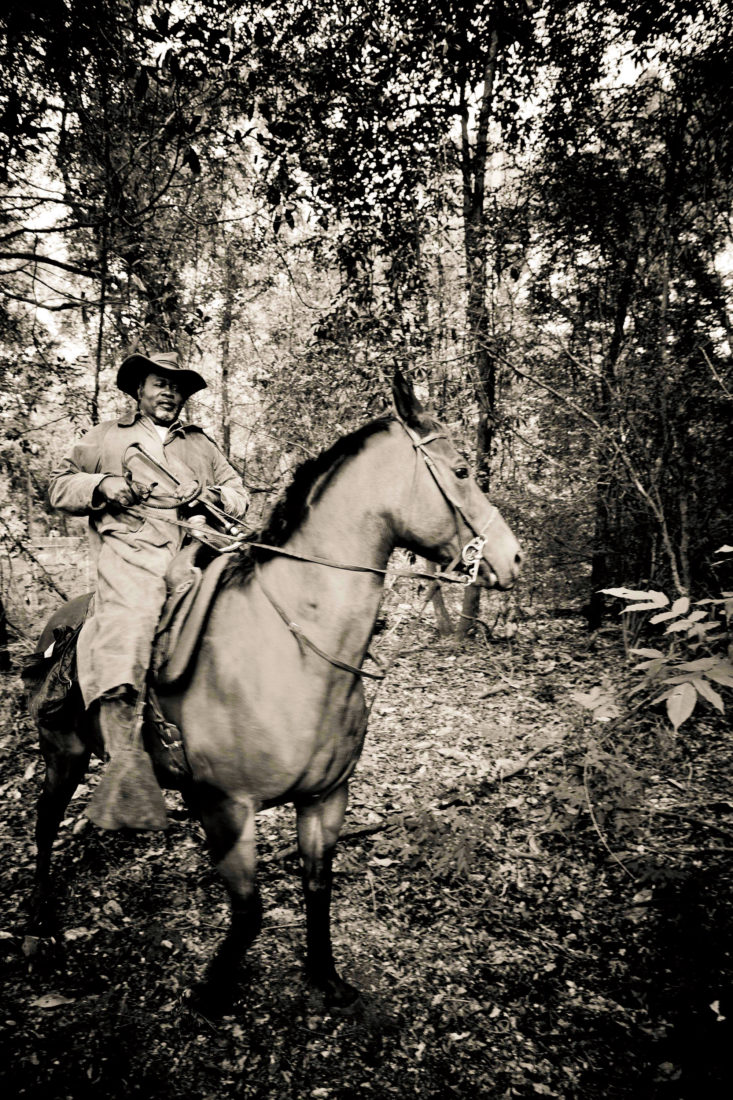
Photo: Peter Frank Edwards
On the Trail
Green deep in the Lowcountry woods.
Sopping the last of his gravy, Green noted a relentless stream of profanity emanating from the stable yard, Old Man Bailey trying to curse a lawn mower into compliance. He knew something about small engines, so he casually strolled over.
“Can I help you with that?”
He could and he did. Old Man Bailey hired him on the spot, diploma be damned. That was forty-two years ago. “Cutting the grass or killing a wild hog and cooking it for the men,” he notes with satisfaction, “I did it all.”
But there was more than that, considerably more. Green took charge of the hounds for deer, hog, and fox hunting, handling, breeding, training, with the same loving-kindness that worked on mules, horses, and dolphins. “You handle pups before their eyes even open. You touch them, rub them all over. You let them get your scent. I can tell from when I first lay my hands on them which ones will be naturally good and which are going to take more work.”
Fox hunting? A Gullah man riding with his hounds, leading the long string of riders, jumping logs, fences, and ditches, dressed in knee britches and cutaway coat, perched on an English saddle and blowing a brass horn? “Oh yes,” he says, chuckling, “I wore the red, but later on I was the fox.”
The explanation tumbles out of him. There are hardly enough foxes around to run these days. A few drops of fox urine on a towel, towed high speed behind his horse, and his hounds bellowing after, noses to the trail, over hill and dale. The riders have the merriest of times and no foxes need to die. Green claims to be the only black master of hounds in the country, and he may be right.
And there were adventures—and misadventures aplenty. “I rode a horse into quicksand once,” he casually notes. “I got myself out, then I got the horse out. But the saddle’s still down there.” There was a cornered whitetail doe that rose up on her back legs and fought like a man, hooves to fists, and the buck that came at him with his horns.
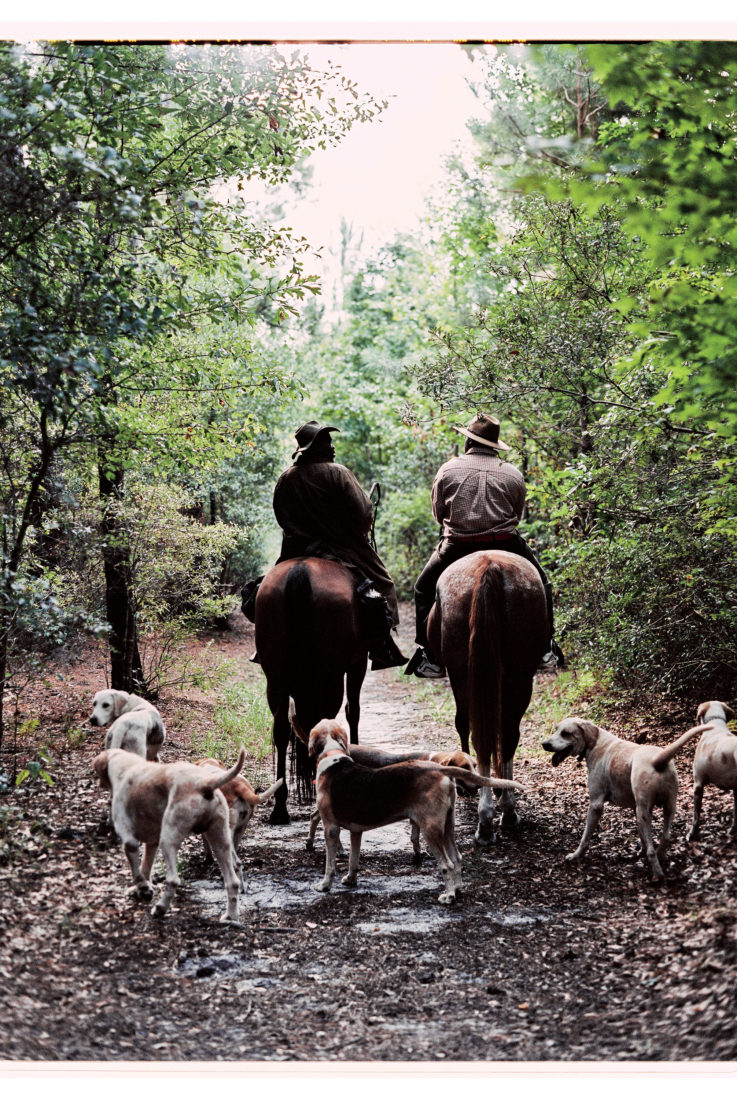
Photo: Peter Frank Edwards
Green (left) with his son, Jaime.
Indeed, wise old bucks hold special power, so much that Green will not kill them anymore. He’ll take a doe, he says, and sometimes a young hog, but only if somebody needs the meat.
And, of course, Green knows how to handle that meat. The huntsman, river man, master of hounds can cook, too. Green was “working up some soups in Charleston” when he heard of economic opportunity on Beaufort County’s St. Helena Island. Smack in the middle of St. Helena is the tiny hamlet of Frogmore, astride U.S. 21, which carries a million visitors each year to Hunting Island State Park. Right in the middle of Frogmore was Teeny Bishop’s store, a vacant 1890s mercantile company that once supplied St. Helena’s Gullah farmers. Green moved right in and opened Gullah Grub Restaurant.
Soon Martha Stewart came calling, as did Anthony Bourdain. Good food and good press helped launch a catering service, mail-order sauces and spices, and flash-frozen authentic Gullah fare overnighted to your door anywhere in the United States. Now there is talk of his own show on cable. “I might get too old to hunt,” he says, “but it will be a long time before I’m too old to cook.”
Green is talking to the spirits now, or maybe they are talking to him. It’s as if I am not even there at all. Rain rattles a steady tattoo on Miss Liza’s roof and drip-drip-drips from her eaves.
“We had this big old buck down in this rice field. The hounds got on him and away he went. He was going to get shot. So he circled around the field till he saw this young boy on stand. He showed himself to that boy. He showed his chest and horns. He looked that boy in the eye and he had that boy’s heart. He looked that boy in the eye and he ran right to him and the boy let him pass. ‘Shoot, shoot, why didn’t you shoot?’ I hollered. But the boy just said he couldn’t.”
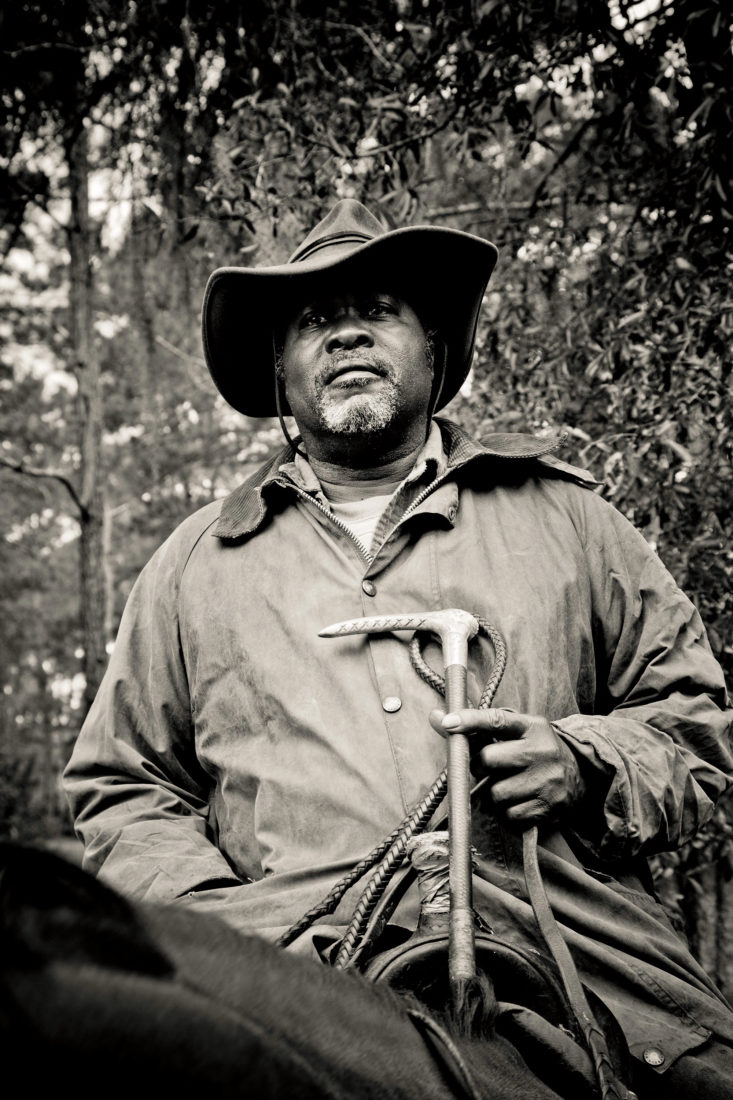
Photo: Peter Frank Edwards
Renaissance Man
Green during a day in the field.
The east brightens, the rain slacks off, and a sweet breeze wafts up from the low-tide rice fields. The spirits catch their breath; they are done for now. We are done too. We shake hands and take our leave.
I walk away pondering many mysteries, but I know this. Bill Green holds my heart as that buck held that boy’s heart when he bolted from that rice field. White or black, doesn’t matter. We both love this Lowcountry, and that binds us like brothers.


